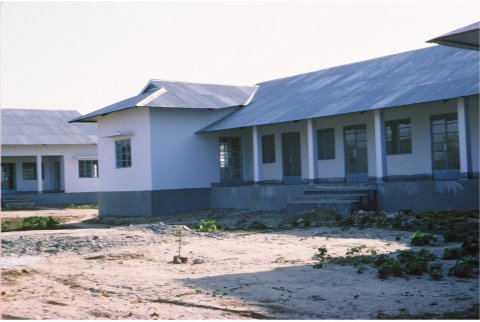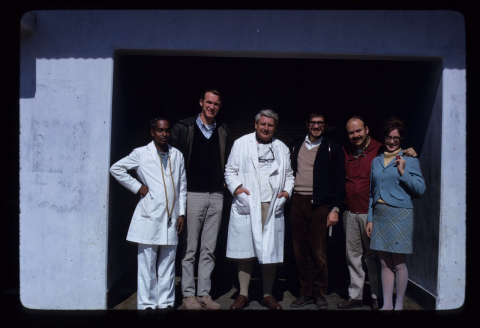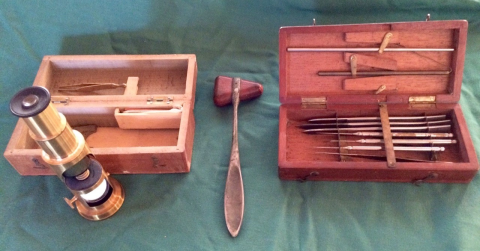Two leaves and a bud: the significance of the Mackay Medal and its namesake
During his career, Dr Donald Mackay was a pioneer of early tropical medical care, particularly renowned for his work on improving the health of tea plantation workers in South Asia. Dr David Nalin commemorates his life.
From Scotland to Sylhet

Decades before bureaucrats had cooked up our modern alphabet soup of HMOs, ACOs and EHRs, a Scottish physician in the northeastern corner of East Pakistan (now Bangladesh) had found a recipe for streamlined and effective medical care in a catchment area of tens of thousands of rural villagers.
Dr Donald Mackay was Chief Medical Officer of the Sylhet tea plantations of the James Finlay Company, originally established in Bengal in 1901.
With proud Scottish discipline, a strictly merit-based hierarchical structure, completely paper-based records and a reliance on talented local Bengali staffing, Dr Mackay oversaw a health system that, as Dr David Sachar recalls, cared for all employees and their families with professionalism, efficiency and compassion.
A vigorous promoter of research, applied public health and clinical medicine, Dr Mackay’s path started in Glasgow and led him to Northern Rhodesia (now Zambia), Ghana and Sylhet [1], where he established a new Central Hospital in Balisera.
He introduced continuing education training programmes for local staff doctors and monitoring off-tabulated records on morbidity and mortality and other parameters.
This provided the basis for a series of publications ranging from poisonous caterpillars (a hazard for the feet and hands of workers plucking tea—two leaves and a bud) to iron malabsorption in patients with iron-deficiency anaemia [2-4].
Research and discovery

During the Sylhet years (1958-73), Dr Mackay was a frequent visitor to the then-Pakistan-SEATO Cholera Research Laboratory (PSCRL), Bangladesh (now the International Center for Diarrheal Diseases Research, Bangladesh).
Dr Norbert Hirschhorn recalls that, at a 1966 Pakistan Medical Association presentation of his preliminary results of research on intra-intestinal infusion of glucose-electrolyte solutions, Dr Mackay remarked presciently that this would prove to be the most important discovery of the PSCRL. There were still many sceptics who viewed the idea of oral rehydration as unworkable.
But, as Dr Mackay had anticipated, the first successful clinical trial of oral rehydration therapy [5] was under way by March 1968, when Dr Mackay presented a lecture at the PSCRL on Balisera mortality rates and causes between 1946-67.
Long-lasting achievements
Throughout his life, Dr Mackay worked ardently toward providing improved standards of care for labourers in the tropics [6]. All were impressed with the new hospital Donald oversaw, along with his devotion to practical research, to documenting the disease burden of the tea workers and to improving their health.
As Jon Rohde noted: “When scanning the crèche, where children were cared for while their mothers worked in the gardens, he [Donald] could seemingly instantly spot a child in need: a cloudy cornea of vitamin A deficiency, a cough that sounded like pertussis, early edema of kwashiorkor, pale membranes of anemia – somehow he could cover a group of 20 children in a few moments and immediately single out those needing further examination and care.” [4]
Others recalled his tracking TB patients’ progress by body weight. One of his most important contributions was the quantitation of the enormous impact of the Bangladesh War of Independence on child mortality rates, revealing a rise from 27.4 to 105 deaths per 1000 for toddlers alone [7].
Support for UK-US relationships

The lasting relationships Dr Mackay and his wife Barbara developed with many of the Balisera guests, who consisted of PSCRL researchers and visitors from both the Centers for Disease Control in Atlanta and the US National Institutes of Health, were possibly the origin of his lifelong enthusiasm and support of collaborative UK-US relationships.
Many of his former guests later took their Diploma in Tropical Public Health degrees when he was senior lecturer and later Deputy Director of the Ross Institute at the London School of Hygiene & Tropical Medicine.
Delivered with him holding a sort of swagger stick, Dr Mackay’s lectures on plantation medicine and on solid waste disposal still resonate today, as do his London medical tours (including the John Snow Pub commemorating the father of epidemiology).
His fascination with all things American, such as a small dated sign beside a derelict door reading “Site of the Chancellery of the Republic of Texas,” also stays with all who knew him.
The Mackay medal is a living tribute to Donald’s remarkable life and a commemoration of his lifelong promotion of UK-US collaboration in medical education and research. The award is presented in alternate years by the Royal and the American Societies for Tropical Medicine and Hygiene.
Based on contributed reminiscences of (in alphabetical order): Dr Richard Cash, Dr Alejandro Cravioto, Dr Norbert Hirschhorn, Dr Myron Levine, Dr Donald Lyman, Dr Philip Mackowiak, Mrs Helene Martin, Dr Stanley Music, Dr Jon Rohde, Dr David Sachar.
References
1. Bradley D. Donald Miller Mackay. Lancet 1981, ii (8244) Aug.: pp482-3.
2. Mackay DM. Injury caused by caterpillars among tea garden workers. Pak. Med. Assoc. (E.Z.) Journal Sylhet 1967, 1(3), Nov.: pp14-19.
3. Mackay DM. Kwashiorkor. E. Pakistan Med. J. 1963, VII (3): pp1-8.
4. Mackay DM and Rohde JE. Iron malabsorption in iron deficiency anaemia. J. Med. Sci.(Indonesia).1979. IX, pp67-72.
5. Nalin DR, Cash RA, Islam R, Molla M and Phillips RA. Oral maintenance therapy for cholera in adults. Lancet. 1968. ii: pp370-378.
6. Bradley D. In Life-Giving Memory. 1990. Finlays Magazine, Autumn. pp.12-13.
7. Mackay DM. The effects of civil war on the health of a rural community in Bangladesh. J. Trop. med. Hyg. 1974, 77:120-127. Vol. II, Number 8244, on pp 482-83.
A NOTE ABOUT THE ORIGIN OF THE MACKAY MEDAL
In the wake of Dr Mackay’s death at age 61, his numerous admirers among his colleagues and friends in the UK and abroad contributed towards the Donald Mackay memorial fund. The fund was initially conceived to commemorate his life and work and to support medical education, training and research in plantation industries. The criteria were ambitious: “innovative, practical, propagative, evaluable and designed so as not to absolve companies or governments of their responsibilities”.
This proved challenging at a time of economic downturn and slashed funding for tropical medicine, together with potential barriers posed by shifting attitudes regarding foreign projects in the developing nations. These factors led to donor recommendations for a revised focus on recognition by a prize and lectureship of leading contributors to advances in tropical medicine whose work had advanced the original memorial fund goals.
The regulations for the medal and technical details were shepherded by Dr David Bradley and the first award was presented to Dr Ralph Henderson of the WHO at Cambridge University in July 1990 [6].